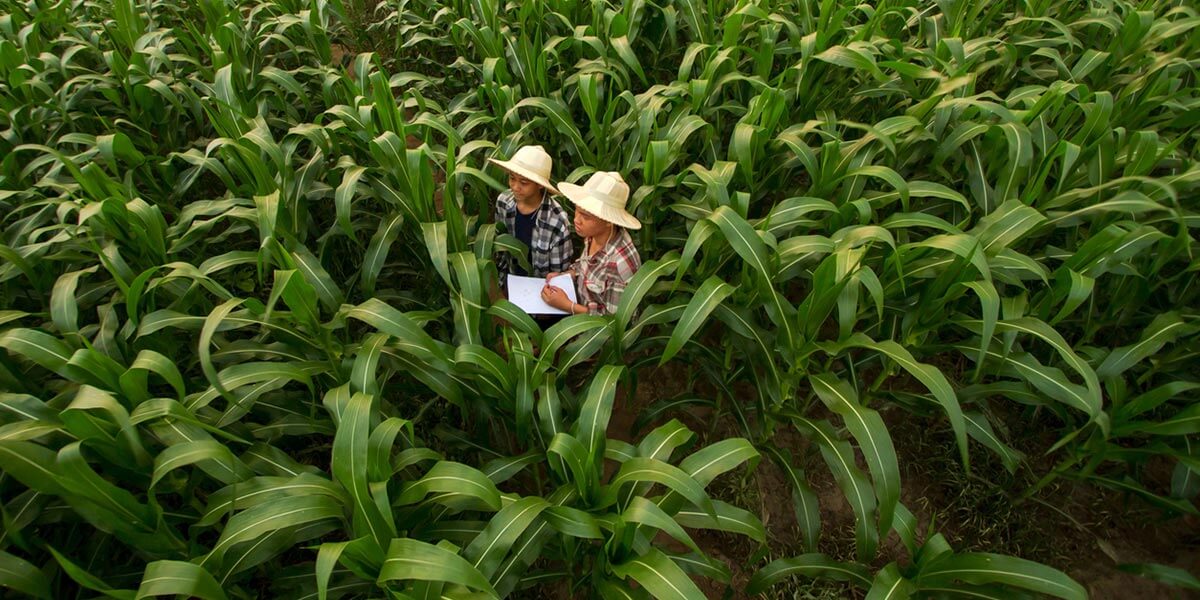For years, the leaders at Ingredion have set aggressive corporate sustainability goals. A Fortune 500 and a leading global food ingredients supplier, Ingredion has committed to sustainably sourcing 100 percent of its corn, tapioca, potato, pulses, and stevia by 2025. These ingredients make up 99 percent of their global crop purchases. Leaders at Ingredion have also set bold sustainability goals that align with the United Nations' 17 Sustainable Development Goals to be met by 2030.
Ingredion supplies sweeteners, starches, nutrition ingredients, and biomaterials to some of the world’s top consumer-facing brands—producing everything from food and beverages to paper and pharmaceuticals. So, Ingredion’s investments in sustainable sourcing also contribute to the corporate sustainability goals of their global clients.
Perhaps more than other companies, Ingredion sits at a unique position in the global sustainable agricultural supply chain, serving as a link between agricultural growers and consumer-facing companies in more than 120 countries that depend on agricultural commodities.
This makes Ingredion well-positioned in the global supply chain to bridge the gap between realities on the ground and pressures in the boardroom. For this reason, Ingredion works to bring different stakeholders together to discuss common sustainability challenges, collaborate on innovative solutions, and ultimately, support the local actions needed to create more sustainable agricultural supply chains.
Partnership development and strategic collaboration will be vital for solving today’s toughest sustainability challenges. Recently we spoke with Ingredion’s corporate sustainability team—including Vice President Brian Nash, Senior Manager Andy Utterback, and Khalid Aziz, lead for the Pakistan sourcing region—about the lessons they’ve learned on harnessing the power of partnership development to advance corporate sustainability goals.
3 Ways Companies Can Collaborate to Create Sustainable Agricultural Supply Chains
1. Align Early with Regional and Local Field Teams to Understand Challenges on the Ground.
Companies often struggle to translate corporate sustainability goals with on-the-ground initiatives. Typically, different regions, countries, and local areas can experience dramatically different challenges. For corporate sustainability goals to be met, companies increasingly recognize the need to engage their regional and country-specific field teams early and often.
Local field teams are ultimately responsible for implementing sustainability initiatives, and they—more than anyone—understand the unique on-the-ground realities and challenges that can prevent sustainability goals from being met. Local field teams also have a wealth of knowledge and understanding about what solutions have a better probability of working and the best ways to implement them. For Ingredion, activating local teams in partnership with Aziz, for example, is imperative for ownership and well-designed interventions.
At Ingredion, Utterback has made engaging with his regional and local field teams a priority. As early as possible, Utterback brings the company’s corporate goals and key milestones to the local teams, so they can plan and strategize what they will need in the coming year(s), in terms of resources, actions, and partners.
“Once I have a clear picture on what we need to do and why, then I present that to the local teams to help them understand why their targets are important as a business deliverable,” said Utterback.
As Utterback notes, some sustainability projects are regional in scale and can pull in groups from different countries to align and channel their work in the same direction. But there are also country-specific initiatives that have unique challenges requiring different resources—or partners—to make progress. “From here, it’s grinding through execution of our plan and realizing that there will be setbacks and challenges, and strategies that do not work out,” shared Utterback. “We have to be prepared to overcome these challenges and find ways around them.”
2. Be Strategic About Harnessing Pre-Competitive Collaboration for Systems Change
More and more, advancing high-priority corporate sustainability initiatives demands a system-wide transformation. However, transforming an entire commodity system like corn or wheat is not something Ingredion can do on its own. Many farmers sell to multiple corporate buyers across a variety of crop rotations throughout the year.
To achieve system-level change, Ingredion needs to reach tens of thousands of farmers, and numerous grower organizations around the world need to embrace sustainability efforts. Inspiring this kind of wide-reaching change demands collaboration and strategic partnership development on the part of the major buyers who purchase from farmers.
“As we make ambitious targets like 100% sustainably sourcing our supply chain—and we know our competitors are making similar claims—the only way anyone will reach this goal is by working together to get grower organizations and farmers on board with sustainability,” said Utterback.
When it comes to partnering, not all sustainability initiatives are created equal. Some work better for pre-competitive collaboration than others. Nash has found that pre-competitive collaboration works well when the goal is to create greater standardization within an industry.
To help set a partnership up for success, start by identifying the overlapping challenge or intersecting motivation that all partners share. This ensures that every partner feels they can directly benefit from the partnership and the associated sustainability initiative.
Then, this must be translated into implementation and action at the local level. At Ingredion, Nash and Utterback take a multi-stakeholder approach to partnerships that include collaborating with their customers, competitors (in a pre-competitive space), peers, and other partners across the agricultural supply chain. Then, on the ground, Aziz works tirelessly with local stakeholders to provide access to finance, inputs, and training for the farmers he works with.
3. Be Candid about Sustainability Struggles to Build Trust Between Partners
When companies partner with competitors or others in the same industry there can be an understandable reluctance to share information or acknowledge challenges. Yet, Nash has found that greater candor with his customers and competitors about Ingredion’s sustainability challenges has delivered better results. By building trust and being as open and frank as possible—without revealing proprietary information—Ingredion has built more productive and effective partnerships. “We’re in a unique space to be open about our hurdles, which enhances our customers’ understanding of the challenges farmers face on the ground,” said Nash. “Once we started the approach where we share our challenges, we have seen our partners even more willing to engage in projects and join us at the table, because that’s where we will find the answers.”
Strengthen Your Sustainable Agricultural Supply Chain With Strategic Partnerships
The Sustainable Agriculture Initiative (SAI) Platform demonstrates how this locally focused, pre-competitive collaboration can work. Through the SAI Platform, Ingredion and other leading multinational agribusinesses such as PepsiCo are working to build trust, tackle common challenges, and advance sustainable agricultural supply chains in Pakistan.
“We are optimistic about the SAI Platform initiative,” explained Nash. “It’s a model where each company can share costs and resources, and combined we have the ability to do more together than any of us could do on our own. I’m also excited to see how this initiative works, not only because it has the potential to drive progress toward greater sustainability and regenerative agricultural practices in Pakistan, but if successful, it may be a model that we can replicate in other regions and countries.”
Aziz and his team will be instrumental in achieving these results on the ground, bringing focus to opportunities for reducing food loss through aflatoxin control and economically empowering women to increase climate resilience at a sector level.
When it comes to solving today’s sustainability challenges, collaboration will be key on the road ahead. Ingredion has engaged strategically across industries, with clients and competitors, and with its partners and farmers on the ground to create more sustainable agriculture supply chains.
Partnership, in short, has been a critical tool, helping Ingredion drive progress toward their corporate sustainability goals.



